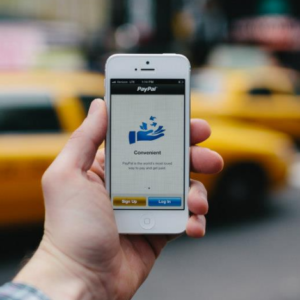Every time the market makes things easier and less expensive for consumers, the government steps in to “correct” it.
For instance, prepaid cards and person-to-person electronic payment services like PayPal and Google Wallet. These have made it much easier — and much safer — for people to send and receive cash without actually sending or receiving cash.
PayPal and Google Wallet have simplified making person-to-person payments online — such as paying for items bought on eBay.
No one has been complaining about any of it.
Pre-paid cards are sold … everywhere. And used by millions. They are used to buy things without using cash — or credit cards — or traditional banks, which has been a godsend for people who for one reason or another either don’t have a traditional bank account or don’t want one. The cards are also used by colleges to distribute financial aid to students, tax refunds to taxpayers and for countless other purposes.
The business has grown from less than $1 billion in 2003 to more than $100 billion as of this year.
The cards are attractive because they are — like cash — straightforward but without the risk of actually carrying cash. They also end-run fees associated with traditional banks, such as having to maintain a certain balance in one’s checking account else be dunned each month for the privilege of letting the bank use your money (which, along with making loans, is how banks make their money).
They are simple, easy to understand — and easy to use. You buy a card — and “load” it with however much money you’d like, then either use it yourself or give it to someone else, such as a friend or family member, to use. This greatly reduces the risk; unlike a credit card or debit card, the worst that can happen in the event a pre-paid card is lost or stolen is the face value of the card has been lost.
Your account can’t be vacuumed empty — and your credit can’t be ruined. There are no annual fees or “hidden” fees, either. You pay as you go.
PayPal works the same way. Instead of the rigamarole of using a credit card to buy something, you transfer funds to — as a for-instance — a seller on eBay; PayPal charges a fee based on the amount of the transaction. The fees associated with each transaction are plainly stated — and unlike using a credit card, there’s no interest to be paid on the transaction.
PayPal is also heavily used by non-profits and smaller websites that depend on donations for their financial survival. It provides an anonymous (if you like) way to support a cause or publication without sending cash through the mail, or having to use a credit card or check to do so.
Obviously, there’s not a problem.
That hasn’t stopped the Consumer Financial Protection Bureau from issuing a 1,689 page regulatory fatwa — the Prepaid Card Rule — that would micromanage prepaid cards and person-to-person payment services like PayPal, making them more of a hassle to use — and (of course) more expensive to use.
It did so back in October, Midnight Judge-style, just a couple of weeks prior to the election and probably out of fear that the election wasn’t going to go the way CFPB bureaucrats were hoping. Very much in the same manner that soon-to-be former President Obama’s EPA peremptorily issued a fatwa decreeing carbon dioxide a “pollutant” one full year before the deadline for this decision — and also imposed expensive fuel-efficiency mandates on the car industry just weeks before the election — for the same apparent reasons.
In both cases, the hand of the dead sought to grab the ankles of the living, seemingly out of pure spite for the contrary wishes of the public, as expressed by the elections results.
If these regulations — which no one voted for — become law, lengthy disclosure forms would have to be issued each time a person bought a card — and similarly prolix “user agreements” would attend each PayPal/Google Wallet transaction. Critics note that the CFPB regulations could also apply to cashless/automated toll payment systems such as EZPass. Drivers might be required to “agree” each time the system attempts to pay a toll. Drivers would either have to stop and tap their cell phone — or tap it while driving, creating a distraction as well as a hassle.
The CFPB’s rules are so pedantic, they even extend to decreeing the font size the disclosures and user agreements must have. Whether this will fit on a credit card-size pre-paid card is something CFPB seems not to have considered.
It’s so bad that joint “congressional disapproval” resolutions have been introduced by Rep. Tom Graves, R-Georgia, and Rep. Roger Williams, R-Texas, — and President Trump has the handy tool of the Congressional Review Act at his disposal to dispense with this last-gasp attempt by Democrats to continue their Big Brothery micromanagement of the economy after voters rejected both it and them.

